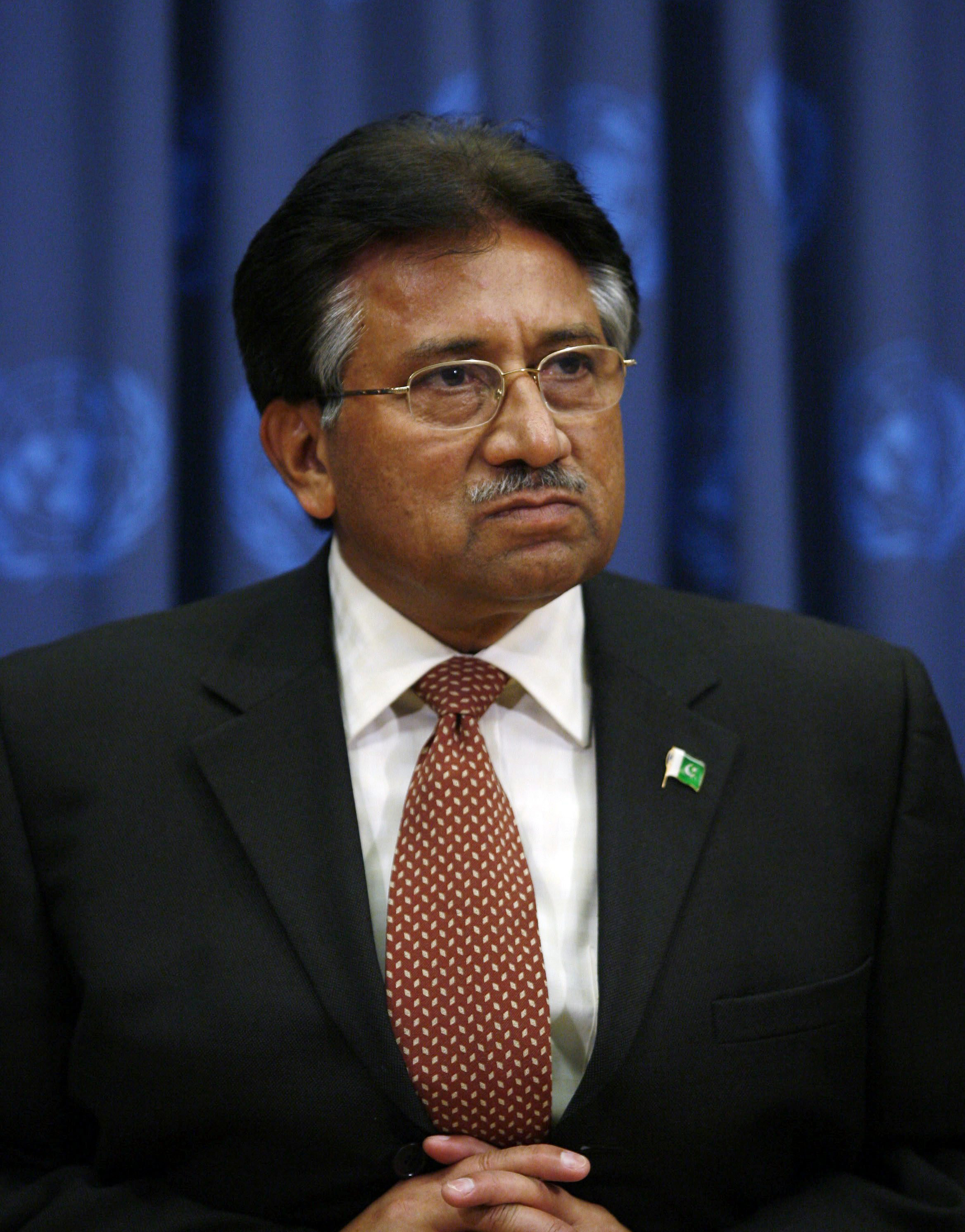Musharraf, Pervez << moo SHAHR rahf, PEHR vehz >> (1943-2023), ruled Pakistan from 1999 to 2008. He came to power in a military coup (overthrow of the government). Following the coup, Musharraf suspended the country’s democratic institutions and claimed all power for himself. In 2002, he announced sweeping changes to Pakistan’s Constitution that were designed to cement his hold on power. In late 2002 and early 2003, he revived Pakistan’s democratic institutions. But the constitutional changes had given him much power to control these bodies.

In 2001, Musharraf became a key ally of the United States and other countries in their efforts to fight terrorists in Afghanistan, Pakistan’s neighbor to the north. On Sept. 11, 2001, terrorists had attacked the World Trade Center in New York City and the Pentagon Building near Washington, D.C. United States officials blamed the attacks on exiled Saudi-born millionaire Osama bin Laden and his al-Qa`ida terrorist organization. Bin Laden was hiding in Afghanistan, where he was protected by the Taliban regime. The Taliban, a conservative Islamic group, had taken control of Afghanistan in the mid-1990’s. In October 2001, the United States began military action in Afghanistan in support of Afghan rebels who opposed the Taliban and al-Qa`ida. Musharraf cooperated with the United States in this operation. He agreed to share intelligence with the United States and allowed it to use some Pakistani air bases. Musharraf’s cooperation with the United States displeased some Pakistanis, particularly supporters of the Taliban, and led to sometimes violent protests. The Afghan rebels drove the Taliban from power in late 2001.
Musharraf was born in Delhi, India, on Aug. 11, 1943. When Pakistan and India gained independence as separate countries in 1947, his family moved to Pakistan. Musharraf graduated from the Pakistan Military Academy in 1964 and joined an artillery regiment. He later attended other military schools, including the Royal College of Defence Studies in the United Kingdom. Musharraf fought in several conflicts and rose through the ranks of Pakistan’s military. He was promoted to major general in 1991, and to lieutenant general in 1995. In 1998, Musharraf was promoted to the rank of general and appointed army chief of staff.
In 1999, Musharraf led a military take-over of Pakistan’s government. He arrested the democratically elected prime minister, Nawaz Sharif, and forced him into exile. Musharraf named himself chief executive and suspended Pakistan’s national Parliament and provincial legislatures. In 2001, Musharraf appointed himself president and head of state and formally dissolved the country’s legislative bodies. He later agreed to comply with a Pakistan Supreme Court ruling that civilian government be restored by October 2002.
In 2002, Musharraf called for a referendum to approve his regime’s policies and extend his term as president for five years. In the referendum, Musharraf claimed to have won overwhelming voter support to extend his presidential term. However, some people challenged the referendum as a violation of Pakistan’s Constitution. Musharraf then announced sweeping changes to the Constitution in an attempt to tighten his grip on power. He permitted democratic elections for Pakistan’s National Assembly and Senate, and for provincial legislatures. Many members of Parliament protested Musharraf’s changes to the Constitution. In late 2003, Parliament endorsed a revised version of Musharraf’s changes. As part of a compromise, Musharraf agreed to step down as head of Pakistan’s armed forces by the end of 2004. However, in December 2004, he announced that he would continue to serve as military chief. Parliament had passed a law the previous month allowing Musharraf to remain in the post.
The Pakistani Parliament held a presidential election in 2007. Preliminary results showed Musharraf to be the winner. However, the Supreme Court debated whether Musharraf had been eligible to be reelected as president while also serving as army chief. Musharraf declared emergency rule, dismissed the Supreme Court judges, and placed them under house arrest. He stepped down as army chief and was sworn in as president. Musharraf then lifted emergency rule.
In 2008, Pakistan held parliamentary elections. The new Parliament elected Yousaf Raza Gilani as prime minister. In August, Musharraf’s opponents in Parliament announced plans to impeach him. Musharraf resigned as president of Pakistan and left the country. He lived in London, England, for several years, and then in Dubai, United Arab Emirates (UAE). In 2010, Musharraf announced the formation of a new political party, the All Pakistan Muslim League. He returned to Pakistan in 2013 to lead the party in general elections scheduled for May. In April, he was arrested over charges related to the imprisonment of the Supreme Court judges in 2007. The Peshawar High Court banned Musharraf from running for office for the rest of his life. Musharraf traveled to the UAE in 2016 to seek medical treatment for an illness.
In 2019, while Musharraf was in the UAE, a special three-member court in Pakistan sentenced him to death. He had been charged with high treason, for suspending the Constitution and declaring emergency rule in 2007 in order to stay in power. Musharraf claimed the charges were politically motivated. In 2020, the Lahore High Court declared the special court that had sentenced Musharraf unconstitutional. The High Court overturned Musharraf’s conviction and sentence. Musharraf died of illness on Feb. 5, 2023.
